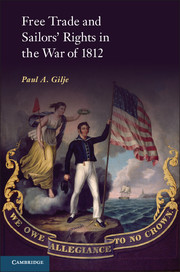22 - The Persistent Dream
Published online by Cambridge University Press: 05 March 2013
Summary
American diplomats did not let free trade fade away, at least when it came to neutral rights, reciprocity, and the breaking up of mercantilist monopolies. These three overlapping notions of free trade became the centerpiece of American foreign policy in the years after the War of 1812. The United States gained limited international recognition for neutral rights, which, like impressment, was more a matter of principle in a world at peace than the real problem it had been during the Anglo-French conflicts before 1815. However, as far as reciprocity and opening trade with European colonies in the West Indies and elsewhere were concerned, what was not won on the battlefield was achieved through diplomacy and a shifting global context. The American triumph was not complete, but in pursuing the persistent dream of a new diplomatic order, the postwar generation proved to be far more successful than their revolutionary fathers.
After the Treaty of Ghent the United States sought a comprehensive agreement on neutral rights with Great Britain that would avoid the problems that had previously bedeviled Anglo-American relations. In the spring of 1815, Clay and Gallatin raised questions about trade with an enemy's colonies, the definition of what constituted a blockade, and the treatment of belligerent privateers and prizes, but they did not insist on including these issues in negotiations that led to a commercial convention in July. This pattern reappeared almost every time American diplomats began serious discussions with the British. When John Quincy Adams sent his note to open negotiations on a new commercial accord in 1816, he suggested that “[i]t is equally desirable, in the view of the American Government, to arrange, at this time, every question relating to neutral rights, particularly those concerning blockade; contraband of war; visits at sea of merchant vessels by ships of war; the trade with the colonies of enemies; and between them and the parent country; and the trade from one port of an enemy to another.” As Adams explained, “The tendency of discordant principles upon these points to embroil neutral and belligerent states with each other has been shown by the melancholy experience of the ages.”
- Type
- Chapter
- Information
- Free Trade and Sailors' Rights in the War of 1812 , pp. 297 - 307Publisher: Cambridge University PressPrint publication year: 2013



